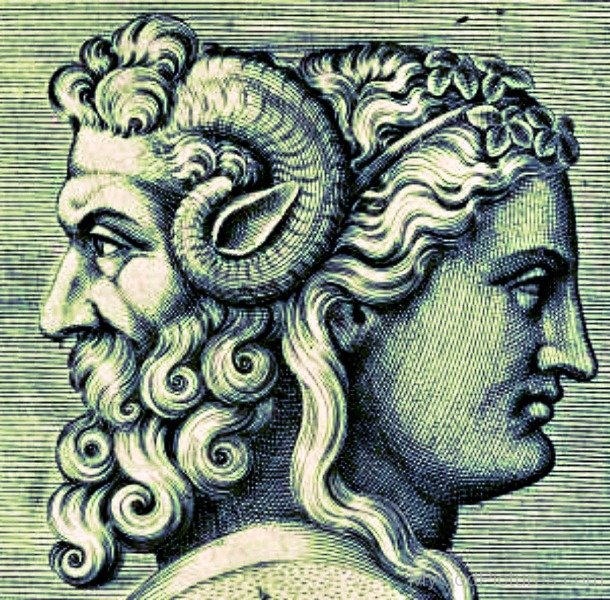Janus: God of Endings and Beginnings
the Mythical origin of January 1st
As a teenager, I never really quite felt the feeling of a New Year beginning on January 1st. I was used to our Persian New Year, where with the Spring Equinox we celebrate the coming of a new year and the rebirth of nature. Walking through the streets of Tehran, the blossoming trees, the flower-buds in the park and the scent of the dawning Spring would stir my senses and prepare my psyche and heart for the new year.
Everything in Iran is about preparing for the New in the few weeks before the start of Spring. We would be cleaning the house, tending all those hidden corners behind the closet and the fridge, places you never come during your usual cleaning hours. Our Persian carpets would receive a deep cleanse, and so would you in the old days, be washed by wrinkly old women in the Hamam. You would dive into your belongings and get rid of everything you no longer needed or used. Out with the old, in with the new! On the eve of the last Wednesday before Spring, we celebrate Chaharshanbe Soori, where originally, all the old you no longer need is burnt in the flames and you jump over the flames as a ritual to purify your psyche and soul. Well prepared in your new clothes, you welcome the Spring!
Growing up in the Netherlands, I never quite felt to do these rituals in the middle of the Winter, where there is no sign yet of any new beginning. Instead though, I got into the reflective mood around the end of December. I would be looking back on the year as this seemed to be some sort of collective mood, and reflect on all that I went through, all the events and happenings of the past year. I would at times, write a letter to myself for the next New Years eve. This was a moment of introversion, of reflection and of incubation. This seemed to fit in the dark and cold days of Winter, and so it became a new ritual.
It is said that in the old times, even in the West the New Year was celebrated at the Spring Equinox, but the calendar back then only had 10 months. So at some point it - obviously - fell out of tune with the Sun. Julius Ceasar solved the problem by adding two more months and marking the beginning of the year January first, as it was the beginning of the month of Janus.
JANUS - GOD OF ENDINGS AND BEGINNINGS
It wasn't until recently that I discovered that the reflective mode we can enter into around New Years eve, is actually a very mythological way, specific to the West. The month January is derived from the ancient god Janus. He is the god of endings and beginnings. He is two faced; one looking towards the past, one looking at the future. He is the gatekeeper, the one who guards the doors between one era and the next. It is said that he is a god that was of aid to humanity for the building of bridges towards a civilisation; it is by the help of Janus that we went from an age of barbarism into a civilised life; he was the one who held the key for the West and opened this door.
In ancient rites, he would be invoked in all kinds of beginnings (and endings). Birth, marriage, funeral and ofcourse, on the first of January. Offerings of spelt (bread) and salt would be made to him. And other times milk, honey and flour. People would not dare to start anything without first invoking the presence of Janus. It would not be considered a healthy beginning for any community, country or even a couple in a marriage, or the transition of the soul after death.
In a time where we have become estranged from myth, symbols and the praise of anything greater than ourselves, it is interesting to see how grandiose the New Year's is celebrated around the world. With so much fireworks going up in flames, we (perhaps unconsciously) howl and shout out to the sky gods, crying out for blessings for the New Year. Through the veils of our self-obsessed culture, I can still see Janus in between the lines on social media where everyone seems to drop into a moment of reflection. In every few messages you can see the two faced god, looking back on a year and looking ahead into a new one.
What would happen if we would remember the origins of New Years and the god of Janus, who once helped the West in a time of barbarism and opened the gates of grace into a civilisation? In a time where our current civilisation is crumbling down, exceedingly out of tune with the rhythms of life and of nature. Perhaps it can be Janus again who will help us end one era so we can enter a new one.
Here’s to Janus: may he close the doors that no longer serve the earth, humanity and this civilisation. And may he grant the graces to open the doors to new beginnings, and help those courageous enough to find those gateways and step through them.
JANUS
God of the key
Gateways closing
Gateways opening
One of your faces
gazes into the past,
remembering our origins
remembering the ancestors
Your other face
looks upon the new
secretly, hiddenly
reflecting wisdom
into the future
for generations to come.


